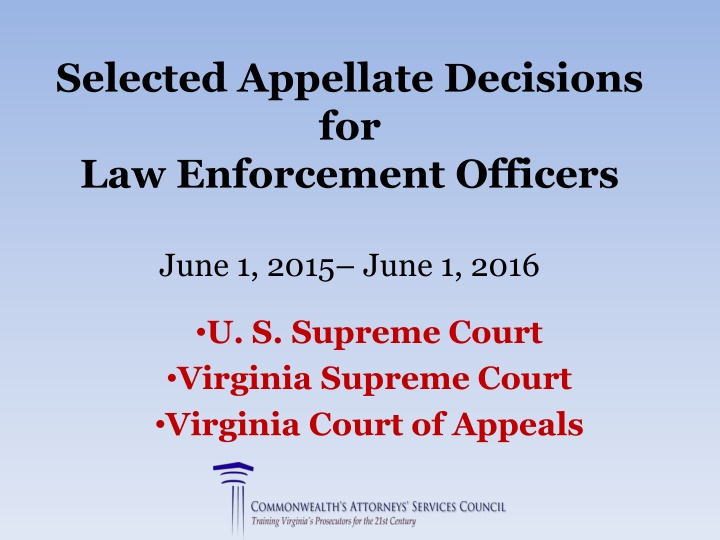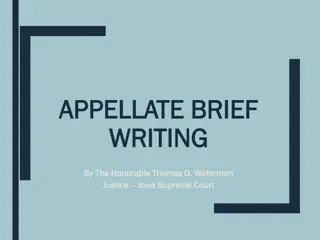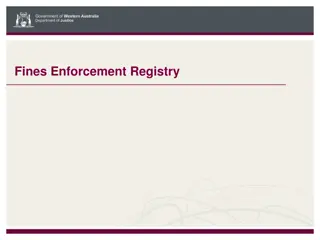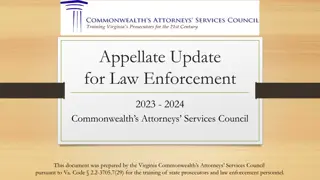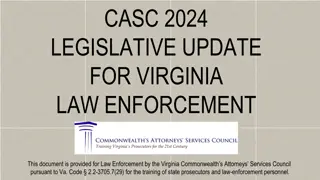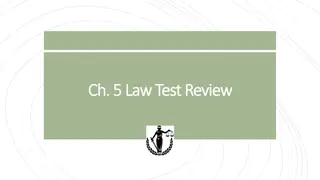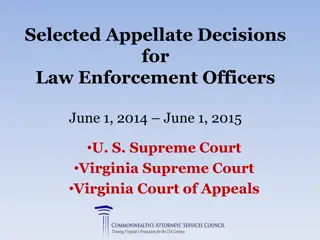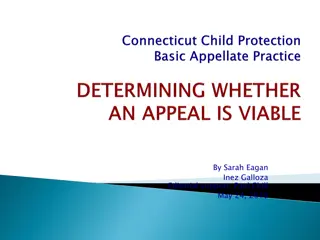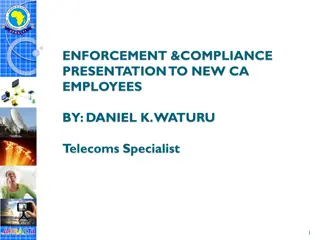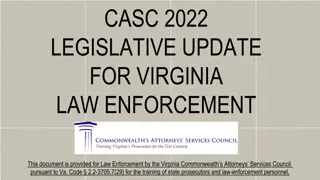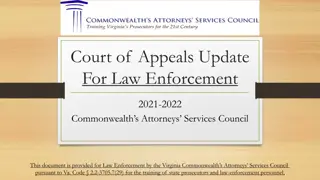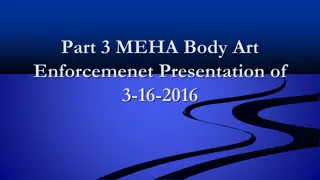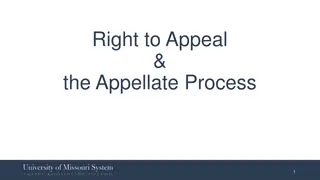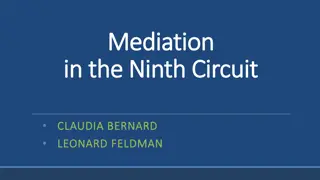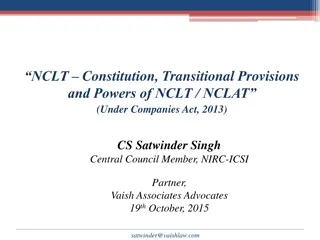Appellate Decisions Impacting Law Enforcement: Summary of Key Cases and Legal Updates
Explore significant appellate decisions affecting law enforcement officers between June 1, 2015, and June 1, 2016, including key rulings by the U.S. Supreme Court, Virginia Supreme Court, and Virginia Court of Appeals. Dive into topics such as the Fourth and Fifth Amendments, crimes against persons and properties, drug offenses, GPS installation timing, historical cell-site data, consent in search procedures, and more. Stay informed about legal principles, evidentiary issues, and jurisdictional matters crucial to law enforcement activities.
Download Presentation

Please find below an Image/Link to download the presentation.
The content on the website is provided AS IS for your information and personal use only. It may not be sold, licensed, or shared on other websites without obtaining consent from the author.If you encounter any issues during the download, it is possible that the publisher has removed the file from their server.
You are allowed to download the files provided on this website for personal or commercial use, subject to the condition that they are used lawfully. All files are the property of their respective owners.
The content on the website is provided AS IS for your information and personal use only. It may not be sold, licensed, or shared on other websites without obtaining consent from the author.
E N D
Presentation Transcript
Selected Appellate Decisions for Law Enforcement Officers June 1, 2015 June 1, 2016 U. S. Supreme Court Virginia Supreme Court Virginia Court of Appeals
Please refer to 2016 Appellate Update Master List for a complete listing of new cases of interest to law enforcement officers.
Topics for Presentation Fourth Amendment Fifth Amendment Crimes Against Persons & Domestic Violence Crimes Against Property Drug & Gun Offenses DUI, Traffic, and Habitual Offender Offenses Evidentiary Issues Jurisdiction & Venue Miscellaneous Offenses
New Cases on Search & Seizure FOURTH AMENDMENT
GPS Installation: Timing If you have a GPS search warrant under 19.2-56.2, you do not need to have a new search warrant to remove and re-install the GPS during the 30-day period. The removal and re-attachment of the GPS tracking device is a single, continuing search that was authorized by the warrant during the 30-day period. Turner v. Commonwealth, Va. Ct. App. (October 27, 2015)
Historical Cellsite Data U.S. v. Graham, 4thCircuit (May 31, 2016) Sitting en banc, the Court reverses a 4th Circuit Panel ruling from August 2015 Held: the Government s acquisition of historical cell-site location data (CLSI) from defendants cell phone provider using a lawful court order did not violate the Fourth Amendment.
Grahams significance Court: The defendants did not have a reasonable expectation of privacy in their phone records, since users voluntarily share their data and clearly know that their cellphone provider is aware of and is monitoring their location. Note: Federal & Virginia Law still require that you use legal process to obtain these records.
Consent: Hotel Rooms White v. Commonwealth, Va. Ct. App. (May 10, 2016) Police responded to an anonymous tip that defendant was selling drugs. Police approached the defendant and he gave them consent to search his person. An officer patted the defendant down and felt a powdery substance in the defendant s sock that the officer believed was illegal drugs. The defendant attempted to stop the officer from removing the item, but the officer recovered it and found that it was heroin.
Officers Visit Hotel The defendant then asked the officer to go tell his girlfriend about his arrest. The girlfriend was in a motel room and she gave the officers consent to search the room. The officers did not check to see who had rented the room. The officers assumed that the girlfriend was the lessee because she seemed to have control of it. The officers saw a bag on a bed in the room. Before an officer opened the bag, the girlfriend told him that the bag belonged to the defendant. Inside the bag, the officers found drugs and distribution paraphernalia.
Held: Heroin in Sock Admissible Even if the defendant withdrew that consent in the course of the search, probable cause supported the seizure of the drugs from the defendant s sock. The Court found that the totality of the facts, including the defendant s resistance, gave the officer probable cause to seize the drugs.
Held: Cocaine in Hotel Inadmissible The defendant established a reasonable expectation of privacy in the bag. The Commonwealth failed to prove that the girlfriend had actual or apparent authority to consent to a search of the bag. Even if the defendant did not have an expectation of privacy in the hotel room, the evidence demonstrated the bag belonged to the defendant. No evidence demonstrated that the girlfriend had any possessory interest in the bag. Defendant did not abandon his interest in the bag by leaving it in the motel room.
Consent: Non-Verbal Hawkins v. Commonwealth, Va. Ct. App. (August 5, 2015) Five officers walked up to the defendant on the street. Their conversation was casual and the officers did not block the defendant s path. When an officer observed a bulge under the defendant s shirt, he asked if the defendant could do him a favor by raising his shirt up a little bit so he could see. The defendant extended his arms out and raised them up and didn t move for five seconds. An officer then lifted the defendant s shirt and found the defendant, a felon, had a firearm.
Court: Affirmed The Court found that the defendant s non- verbal response to the officer s request invited the officers to lift his shirt. After his arrest, the defendant stated that he didn t want to startle the officers with the gun, so he let the officers remove the firearm on purpose. The defendant s later statement to the officer confirmed that the encounter was consensual.
Consent: Probation Searches McLaughlin v. Commonwealth, Va. Ct. App. (November 17, 2015) On probation, defendant signed an agreement that gave his probation officer permission to visit his home. During a transfer investigation, the P.O. visited defendant s home, but appeared that defendant did not live there. The P.O. asked the resident if he could examine the defendant s bedroom. The resident agreed. The resident was not on the lease, but appeared to be in control of the premises. In plain view, the P.O. observed the defendant s belongings along with a handgun.
Court: Affirmed The defendant had consented to the search. Even though a home visit is not equivalent to a complete Fourth Amendment waiver, in this case, the defendant s consent provided the officer authority to view the defendant s bedroom as part of his transfer investigation. The officer also lawfully relied on the resident s consent to the search, even though she was not on the lease.
Fourth Amendment REASONABLE SUSPICION
Reasonable Suspicion: Anonymous Tips Commonwealth v. Gaiters, Va. Ct. App. (March 22, 2016) An officer received an anonymous tip that the defendant was engaged in selling drugs and driving a two-toned SUV. The informant described the defendant in detail. The officer located the defendant and began to watch her. The officer saw the defendant interact with 5 people in 30 minutes, each time interacting with the person as if that person were a drug buyer. The officer detained the defendant and had a drug dog walk around the vehicle; the dog alerted on the vehicle.
Held: Stop was Lawful The trial court had granted a motion to suppress, finding that the officer lacked reasonable suspicion for the detention The Commonwealth appealed Held: Stop was lawful An anonymous tip cannot form the basis of reasonable suspicion without sufficient corroboration. However, in this case, the officer corroborated the substance of the tip with his personal observations, which were consistent with the tip.
Reasonable Suspicion: Informant s Tip Barrett v. Commonwealth, Va. Ct. App. (October 6, 2015) Confidential, reliable informant tells police that the defendant has been receiving marijuana for distribution. Police watch defendant engage in a hand-to- hand transaction involving a large amount of cash in a parking lot on several occasions, and watched the defendant deliver packages to people in parking lots on several occasions.
Police Stop Suspect Police watch defendant collect a bag under extremely suspicious circumstances at the airport and watch him conduct a transaction involving apparent marijuana with a known drug dealer. Police observe him repeatedly meet a woman who was apparently delivering something to him at the airport. Police watch the defendant pick up the woman at the airport, collect her bags, and travel with her to a motel where he had traveled before. Officers stopped him, ran a dog around his car, and found marijuana in his car.
Held: Evidence Admissible The Court reviewed the evidence and found that it was reasonable for an officer to believe that the defendant may have marijuana in the vehicle. Proper to rely on the tip once the officers corroborated the tip.
Reasonable Suspicion: Dangling Objects Mason v. Commonwealth, Va. Supreme Court (May 5, 2016) Officer stopped the defendant for driving with a dangling object , a 3 x 5 parking pass. Officer finds drugs in the car. Defendant appeals and Court of Appeals reversed the conviction. Commonwealth appeals to the Virginia Supreme Court.
Court: Stop Was Lawful Court: It is nearly impossible for an officer to determine, prior to a stop, whether a dangling object actually obstructs the driver s view. However, the statute protects public safety and has an important goal. Here, the fact that the tag was sufficiently prominent to attract the officer's attention during the brief moments that it passed through his field of view sufficiently demonstrated that it might have violated the statute.
Reasonable Suspicion: Dangling Objects Freeman v. Commonwealth, Va. Ct. App. (November 17, 2015) Officers observed defendant driving with multiple objects dangling from the rearview mirror. They stopped the defendant and located drugs and a gun. At a motion to suppress, a detective testified that he was concerned that the dangling air fresheners might impair or obstruct the defendant s view while driving.
Held: Stop was Lawful The Court examined the record, which included photographs of the three dangling air fresheners, and found that the officers had reasonable suspicion to stop the defendant for a violation of 46.2-1054. Both the size of the objects and the fact that they were suspended from the rearview mirror were objective facts that provided the officer with reasonable suspicion that the defendant s view of at least part of the roadway might be impaired or obstructed.
Reasonable Suspicion: Flight Malone v. Commonwealth, Va. Ct. App. (December 8, 2015) Police, on patrol and asked to enforce no trespassing signs at a motel in a high crime area , approached the defendant. As they did, the defendant and his friends saw the police and ran away. Officers pursued the defendant and captured him. They discovered that the defendant had a firearm, ammunition, and was wanted on outstanding warrants.
Held: Stop was Lawful Police lawfully chased and detained the defendant based on reasonable suspicion of criminal activity. The Court rejected the argument that the officer needed probable cause to arrest the defendant at that time and refused to find that the officer arrested the defendant by capturing him and returning him to the motel. By capturing him, Officers simply restored the defendant to the status quo , before he fled.
Reasonable Suspicion: Inspection Sticker Diggs v. Commonwealth, Va. Ct. App. (December 8, 2015) An officer saw the defendant driving and noticed that his inspection sticker was peeling away and that the vehicle had temporary tags. He also noticed the defendant had just left an auto repair shop known to sell counterfeit inspection stickers. The officer stopped the defendant, detected marijuana, learned the defendant was suspended, and found marijuana.
Held: Stop was Lawful At a motion to suppress, the officer testified that he had made roughly 100 such stops for unauthorized inspection stickers and that 9 out of 10 times, he found that the sticker was unlawful. He also recounted the shop s history of selling counterfeit stickers and the area s reputation as a high-crime area. Court found the evidence was sufficient reasonable suspicion for a traffic stop.
Reasonable Suspicion: Loud Music Commonwealth v. Collins, Va. Ct. App. (December 22, 2015) Defendant, a felon, drove past an officer with loud music playing. Under Richmond City Code, it is unlawful to play music from a vehicle if it is plainly audible from at least 50 feet. The officer testified that he was between 42 and 50 feet away at first, and could still hear the music 100 feet away, although faintly. The officer stopped the defendant and recovered a firearm.
Appeal The trial court granted a motion to suppress on the grounds that it s hard to know how the City code is violated because it is too vague. The Commonwealth appealed Court: Stop was lawful. The officer did not need proof that the defendant was actually in violation of the ordinance, only reasonable suspicion.
Arrest v. Detention Osman v. Commonwealth, Va. Ct. App. (December 15, 2015) Officer hears loud bang and sees the defendant partway into a parallel parking spot with his tire on the sidewalk. The area was a high-traffic area with many bars that were letting out at that time of night. Believing the defendant had either been in a crash or was DUI, the officer ran over and told the defendant to stop. The defendant refused at first, then stopped the car but refused to remove his keys or roll down the window. The defendant yelled at the officer.
Officer Investigates The officer then removed the defendant from the vehicle and put him in handcuffs, informing him of his Miranda rights. The defendant, who appeared to be intoxicated, continued to refuse to cooperate and refused to take a breathalyzer. The officer arrested him. Defendant argued the officer lacked reasonable suspicion to stop him and lacked probable cause to arrest him.
Court: Affirmed It was objectively reasonable for the officer to conclude that the defendant may have been driving under the influence. The defendant was not under arrest simply because the officer pulled him out of the vehicle and put handcuffs on him. Once the investigation was complete, the officer had probable cause to arrest the defendant. The defendant s refusal to take a breathalyzer was relevant to probable cause, as was his driving, attitude, and behavior.
Reasonable Suspicion: Pat-Down Fitzgerald v. Commonwealth, Va. Ct. App. (November 10, 2014) Officers walked up to and spoke to the defendant, but noted that he had a bulge in his jacket that appeared to be a handgun. They asked him to keep his hands out of his pockets but the defendant immediately put his hands back in his pockets. An officer patted the defendant down and felt a rectangular, rail-type handgun. The officer grabbed it. Defendant struggled and fought the officer. The officer subdued the defendant and recovered the handgun. Defendant was a felon.
Held: Evidence Admissible The Court found that the incident was a consensual encounter, until the officers developed reasonable suspicion to believe that he had a concealed weapon. The Court noted that the defendant was in a high- crime area known for drugs and violence and that the defendant took his hands out of his pockets but then put them back immediately. The officers observed that the defendant had a bulge on the right side of his jacket that appeared it could be a weapon.
Pat-Down Was Lawful The Court rejected the defendant s complaint that the officer manipulated the weapon unlawfully. Terry does not forbid an officer from manipulating an item, but simply restricts the officer s manipulation to what is necessary to determine if the suspect is armed.
Extending a Stop: Applying Rodriguez v. United States Matthews v. Commonwealth, Va. Ct. App. (November 3, 2015) Officer stopped defendant for Dangling Object, and gave him a warning ticket. During the stop, the officer engaged in a brief conversation with the defendant about his criminal history and tattoos, which were unrelated to the stop. During that conversation, the defendant consented to a search of the vehicle Officers discovered drugs.
Held: Evidence Obtained Unlawfully The Officer did not have a reasonable articulable suspicion that Matthews possessed illegal drugs to justify the extension of the stop by inquiring into his criminal record, discussing his tattoos, and requesting a K-9 unit. Because the detention exceeded the time reasonably necessary to address the dangling object traffic violation, the seizure violated the Fourth Amendment and consequently invalidated Matthews s consent to the search
But The officer s delay in completing the traffic stop violated the Fourth Amendment and consequently invalidated Matthews s consent to search the vehicle. BUT: Since the stop pre-dated Rodriguez v. United States, U.S. Supreme Court (April, 2015) the Court refused to exclude the evidence. The Court decided it would only apply Rodriguez to cases that took place after April, 2015.
Fourth Amendment & Probable Cause WARRANTLESS SEARCHES
Search Incident to Arrest Brown v. Commonwealth, Va. Ct. App. (January 26, 2016) Officers noticed defendant in a high-crime area while patrolling a housing complex marked No Trespassing. Defendant claimed he was visiting someone, but admitted that he did not live at the complex. The signs provided no exceptions under which non- residents were permitted on the property. Defendant was alone in the complex after dark, was nervous during his encounter with the police, and failed to provide a specific name or address for the tenant he claimed to be visiting. The officers patted the defendant down and found a firearm; defendant was a felon.
Trial Court: Stop was Unlawful The trial court suppressed the evidence, finding that the officers did not sufficiently investigate the defendant s claim that he was visiting someone. The trial court also found that the signs did not sufficiently note whether trespassing included visiting someone by authorization. Commonwealth appealed
Held: Stop was Lawful The officers had probable cause to arrest the defendant for trespassing and consequently had a lawful basis to search him incident to that arrest. The fact that the defendant might have had a defense to the trespassing charge was not relevant to probable cause, since probable cause does not demand that the officer s belief be correct or more likely true than false. The No Trespassing signs did not need to say whether or not they applied to people who are visiting people who are residents.
Automobile Exception: Plain Smell Burton v. Commonwealth, Va. Ct. App. (September 22, 2015) At a rest stop, State Troopers noticed the defendant s vehicle smelled of marijuana. They asked the defendant to step out and patted him down, locating two bags of cocaine. The defendant argued that the officers did not have the authority to order him out of the vehicle, arguing that the smell of marijuana, standing alone, was insufficient to demonstrate probable cause to search the vehicle.
Held: Search was Lawful Officers have the authority to search a vehicle when they smell the odor of marijuana from a vehicle. Officers always have the authority to order a driver or passenger from a car at any time for any reason during a lawful detention of the driver or vehicle.
Search Incident to Arrest Purvis v. Commonwealth, Va. Ct. App. (February 23, 2016) Officers stop defendant for traffic offense and learn he is suspended. Telling the defendant that he wasn t worried about the license, an officer asked the defendant if he would consent to a search of his vehicle. Police found cocaine residue in the vehicle. Another officer then searched the defendant and found cocaine on the defendant s person. Police used this information to obtain a search warrant for the defendant s residence, where they found more cocaine.
Held: Evidence Admissible Officers were entitled to arrest the defendant for Driving Suspended, in light of Virginia v. Moore, and therefore were entitled to conduct a search of the defendant incident to arrest. It was irrelevant that the search preceded the arrest, that the officer stated that he was not concerned about the suspended license, and that a different officer conducted the search.
Held: Consent Valid The Court also found the defendant s consent gave the officers authority to search his vehicle. The Court rejected the argument that the officer lied to the defendant about whether he would arrest him for driving suspended. Although the Court agreed that the defendant was in custody at the time he gave consent, the Court found the consent valid in the totality of the circumstances.
Exigent Circumstances: Marijuana Evans v. Commonwealth, Va. Supreme Court, September 17, 2015 Officers smelled the odor of marijuana emanating from the defendant s apartment window. They knocked on the door and the defendant s mother answered. They smelled the odor coming from inside, but the defendant s mother, who was shaking and nervous, denied any marijuana was inside and slammed the door in the officers faces.
